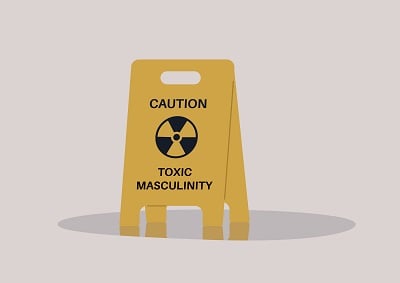What is Toxic Masculinity and How it Impacts Mental Health
What is Toxic Masculinity and How it Impacts Mental Health

If you’ve been around for the past few years, you’ve probably heard of toxic masculinity. You’ve probably also heard that it’s bad and needs elimination. This isn’t going to be another “here’s why it’s bad and here’s why all men are bad” article. Instead, I will briefly summarize toxic masculinity, why it poses problems to men and the broader society, and touch on some specific steps men can take to start helping themselves and society at large change this limiting masculine programming.
Academically speaking, toxic masculinity is the way men are culturally trained and socially pressured to behave. Its three core tenants, toughness, anti-femininity, and power, range in expression from person to person, but all combine to create the sense of “manliness” portrayed in The Expendables movie franchise and That 70’s Show’s Red Foreman.
Below are the core tenants of Toxic Masculinity in greater detail:
- Toughness - Men are strong, aggressive, and emotionally hardened.
- Anti-Femininity - Men reject any and all feminine traits, including most emotion, accepting help, and domesticity.
- Power - Men are worthy only if they have money, power, status, and influence.
Of course, some of these traits can be attributed to natural drives for ambition and adventure, or character traits common to boys and men. However, when they infringe on the freedoms and rights of others, are forced upon someone as the “right way to dude,” or require the dude to deny their own full-range "dudeness" to fit a mold, then it’s a problem.
The embodiment of these traits can contribute to pernicious attitudes and behaviors toward women and marginalized groups. Surprisingly, cultural pressure to fulfil this masculine template can also lead men into myriad of problems, of which repeatedly watching the movie 300 is the least of these.
Here are just a few examples
Young boys are taught by their caretakers to “toughen up” or “suck it up” when hurt or facing challenges. Emotional suppression lays the foundation for shame when unsanctioned feelings arise which position anger and rage as the only acceptable masculine emotion. This “man up” attitude matures into a rejection of empathy toward others and repackages nurturing impulses as “weak.” Anxiety can also develop if children are not trained to manage their feelings appropriately.
Toxic Masculinity opposes mental and physical health treatment even when injured or emotionally struggling. Ignoring pain while pushing oneself to work or exercise can cause more physical damage. Additionally, suppressing mental health issues, such as depression, trauma, and anxiety, can worsen symptoms and precipitate isolation, loss of jobs or friends, and even suicide.
Men are encouraged to embrace an unhealthy lifestyle along with rigid independence. Men do dangerous sports, engage in risky behaviors, have an unhealthy diet, and are encouraged toward excessive drug and alcohol use. Furthermore, men are taught to ignore asking for help as it could show fragility and provoke ridicule.
Controlling and entitlement behaviors are perhaps the most discussed toxic traits. Masculine programming mandates that men should exert dominance over their romantic, work, and social life by suppressing anyone not embracing the masculine programming, and demanding unearned loyalty and respect. The resulting domestic and social conflict, including potential bullying toward marginalized groups, can lead to serious personal, occupational, and legal consequences.
Men can be better. We can be better. While not an exhaustive list, here are a few changes we can implement to reprogram masculinity and stop harming ourselves, our community, and our loved ones.
-
Accept help, and help others. No one is impressed by your exhaustion and stoic struggle. When others extend a hand, let them lift you up. Even better, reach out to someone else, perhaps another guy you know is drowning in something, and offer your help. Both anxiety and depression reduce when we feel connected, supported, and seen by others. You only have better health, more time, effective outcomes, and stronger relationships to gain.
-
Let others be themselves and focus on yourself. Strive to pursue your own character, personal development, and values. When others differ from the limiting masculine programming, allow them to be who they are without criticizing, judging, or attempting to shame them back into the fold. Tearing others down to quell your own anxieties and fears, nor lashing out based in depression, are ineffective. Addressing your own struggles is the way.
Similarly, put an end to controlling behavior. Being threatened by others’ opinions, characters, and choices speaks more to your own insecurities than their unacceptability. -
Model a wide range of emotional expressions to children and young men, and help them discern the cause, purpose, and appropriate channeling of the feeling. This takes genuine courage and may have to start with you practicing being OK with your own feelings and expressing them to a trusted person first. Men experience more feelings than just anger. Can you own your anxieties and face them in effective and sustainable ways? Can you let yourself feel sadness, grief, or depression without shutting down or avoiding the feelings? Acknowledging all your feelings, and knowing how to manage them in healthy ways profoundly benefits your personal health, friendships, and romantic relationships.















